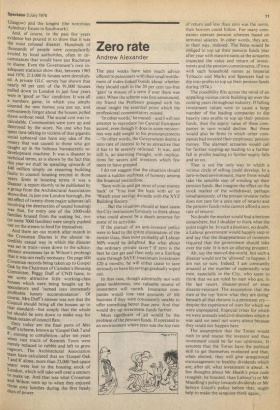Zero rate
Andrew Alexander
The past weeks have seen much advice offered to pensioners with their small entitle ment of index-linked bonds about whether they should cash in the 20 per cent tax-free 'gain' (a misuse of a term if ever there was one). When the scheme was first announced, my friend the Professor grasped with his usual insight the essential point which the professional commentators missed.
'In other words,' he mused—and I will not attempt to reproduce his Central European accent, even though it does in some mysterious way add weight to his pronouncements —'In other words, the Government deems a zero rate of interest to be so attractive that it has to be severely rationed.' It was, and still is, an alarming thought, with implications for savers and investors which few seem to have grasped.
I do not suggest that the situation should cause a sudden outbreak of honesty among the financial institutions . • 'Save with 'us and get most of your money back' or 'You lose the least with us' or 'Watch your savings dwindle with the XYZ Building Society.'
. . . But the situation should at least cause the City institutions furiously to think about what could almost be a death sentence for some of its activities.
If the pursuit of an anti-investor policy were to lead to the entire elimination of the rentier class, then most probably all Labour MPs would be delighted. But what about the ordinary private saver ? If zero is the best he can get and then only on a footling scale through SAYE (maximum investment £20 a month), he will either cease to save seriously or have his savings gradually wiped out.
In that case, though admittedly not with great suddenness, one valuable source of investment will vanish. Insurance companies would lose vast amounts of life business if they were consistently unable to offer something better than zero. And that would dry up investment funds further.
Most significant of all would be the problem of the pension funds. If operated in an environment where zero was the top rate
of return and less than zero was the norm, then horrors could follow. For many com panies operate pension schemes based on terminal salaries. In other words, they are, in their way, indexed. The' firms would be obliged to top up their pension funds year after year with massive sums as the actuaries inspected the value and return of invest ments and the pension commitments. (Firms with such household names as Imperial Tobacco and Marks and Spencers had to dip into profits to top up their pension funds during 1974.) The possibility flits across the mind of an appalling vicious circle building up over the
coming years throughout industry. If falling investment values were to cause a large number of the leading companies to dip heavily into profits to top up their pension funds, then the equity value of these companiesin turn would decline. But these would also be firms in which other companies had invested their employees' pension money. The alarmed actuaries would call for further topping-up leading to a further fall in profits leading to further equity falls and so on.
That is not the only way in which a vicious circle of selling could develop. In a zero-is-best environment, many firms would take the sensible step of winding up their pension funds. But imagine the effect on the stock market of the withdrawal, perhaps simultaneously, of the private investor (who does not care for a zero rate of return) and the pension funds (who cannot afford a zero rate of return).
No doubt the market would find a bottom somewhere, but I shudder to think what the point might be. In such a position, no doubt, a Labour government would happily step in and say that the disappearance of investors required that the government should take over the role. It is not an alluring prospect.
Ah, say the men-of-the-world, but such a disaster would not be 'allowed' to happen. I am not so sure. Indeed, I am constantly amazed at the number of supposedly wise men, especially in the City, who seem to think that we are ruled by men who are, in the last resort, disaster-proof or even disaster-resistant. The assumption that the men at the top 'know what they are doing' beneath all that rhetoric is a persistent cry— despite the experience of wars for which we were unprepared, financial crises for which we were unready and civil disorders which it was said we need not worry about because they could not happen here.
The assumption that the Tories would rush in and rescue the investor and thus investment could be far too optimistic. It assumes that the Tories have the political skill to get themselves re-elected and that, when elected, they will give unequivocal encouragement to healthy dividends which are, after all, what investment is about. A few thoughts about Mr Heath's price code (tougher, he boasted, than Labour's) or Mr Maudling's policy towards dividends or Mr Selwyn Lloyd's policy before that, might help to make the sanguine think again.,


































 Previous page
Previous page